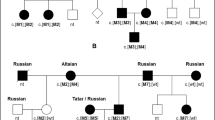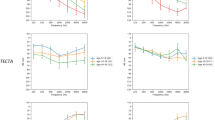Abstract
Hereditary hearing impairment (HI) caused by recessive GJB2 mutations is a frequent sensory disorder. The results of the molecular-based studies of HI are widely used in various genetic test systems. However, the ethical aspects are less described than the genetic aspects. The concerns expressed by individuals from groups with genetic risks must be included in the counseling of patients and their families. For evaluation of subjective opinions of hearing parents about the presumed causes of HI of their children, we analyze the cohort of parents having children with confirmed hereditary HI caused by biallelic recessive GJB2 mutations (in a homozygous or a compound heterozygous state). This study included 70 deaf children with HI due to mutations in the GJB2 gene and 91 questionnaires about the presumed causes of their deafness filled by their parents. Most of the parents at 78% (CI 68.4–85.4%) attributed their children’s HI to “non-hereditary” causes and 22% (CI 14.7–31.6%) to “hereditary” causes (p < 0.05). Therefore, the prior opinions of the parents did not correspond to positive GJB2 genetic testing results. The subjective opinions of parents are probably partly based on family history, since respondents with deaf relatives in their pedigree more likely supposed hereditary causes for HI in their children than the respondents without deaf relatives (p < 0.001).


Similar content being viewed by others
References
Bady-Khoo MS, Bondar AA, Morozov IV, Zytsar MV, Mikhalskaya VY et al (2014) Study of hereditary forms of hearing loss in the Republic of Tyva. II. Evaluation of the mutational spectrum of the GJB2 (Cx26) gene and its contribution to the etiology of hearing loss. Meditsinskaya Genetika 13:30–40 (Article in Russian)
Baldwin EE, Boudreault P, Fox M, Sinsheimer JS, Palmer CG (2012) Effect of pre-test genetic counseling for deaf adults on knowledge of genetic testing. J Genet Couns 21(2):256–272. doi:10.1007/s10897-011-9398-1
Barashkov NA, Pshennikova VG, Posukh OL, Teryutin FM, Solovyev AV et al (2016) Spectrum and frequency of the GJB2 gene pathogenic variants in a large cohort of patients with hearing impairment living in a subarctic region of Russia (the Sakha Republic). PLoS One 11(5):e0156300. doi:10.1371/journal.pone.0156300
Boudreault P, Baldwin EE, Fox M, Dutton L, Tullis LE et al (2010) Deaf adults’ reasons for genetic testing depend on cultural affiliation: results from a prospective, longitudinal genetic counseling and testing study. J Deaf Stud Deaf Educ 15(3):209–227. doi:10.1093/deafed/enq012
Brunger JW, Murray GS, O’Riordan M, Matthews AL, Smith RJH, Robin NH (2000) Parental attitudes toward genetic testing for pediatric deafness. Am J Hum Genet 67(6):1621–1625. doi:10.1086/316901
Burton SK, Withrow K, Arnos KS, Kalfoglou AL, Pandya A (2006) A focus group study of consumer attitudes toward genetic testing and newborn screening for deafness. Genet Med 8(12):779–783
Derekoy FS (2000) Etiology of deafness in Afyon School for the Deaf in Turkey. Int J Pediatr Otorhinolaryngol 55(2):125–131
Dzhemileva LU (2011) Molekyliarno-geneticheskii analiz nasledstvennoi nesindromalnoi sensonevralinoi glyhoti, Dissertation, Moscow. (in Russian)
Gray RF (1989) Causes of deafness in schools for the deaf in Madras. Int J Pediatr Otorhinolaryngol 18(2):97–106
Kelley PM, Harris DJ, Comer BC, Askew W, Fowler T et al (1998) Novel mutations in the connexin 26 gene (GJB2) that cause autosomal recessive (DFNB1) hearing loss. Am J Hum Genet 62(4):792–799. doi:10.1086/301807
Kelsell DP, Dunlop J, Stevens HP, Lench NJ, Liang JN et al (1997) Connexin 26 mutations in hereditary non-syndromic sensorineural deafness. Nature 387(6628):80–83. doi:10.1038/387080a0
Li Y, Steinberg AG, Bain L, Yaeger D, Bieler A et al (2007) Assessing parental attitudes toward genetic testing for childhood hearing loss: before and after genetic consultation. Am J Med Genet A 143A(14):1546–1553. doi:10.1002/ajmg.a.31730
Marazita ML, Ploughman LM, Rawlings B, Remington E, Amos KS, Nance WE (1993) Genetic epidemiological studies of early-onset deafness in the U.S. school-age population. Am J Med Genet 46(5):486–491. doi:10.1002/ajmg.1320460504
Middleton A, Hewison J, Mueller RF (1998) Attitudes of deaf adults toward genetic testing for hereditary deafness. Am J Hum Genet 63(4):1175–1180. doi:10.1086/302060
Mitchel RE, Karchmer MA (2004) When parents are deaf versus hard of hearing: patterns of sign use and school placement of deaf and hard-of-hearing children. J Deaf Stud Deaf Educ 9(2):133–152. doi:10.1093/deafed/enh017
Morton C, Walter E, Nance MD (2006) Newborn hearing screening—a silent revolution. N Engl J Med 354(20):2151–2164. doi:10.1056/NEJMra050700
Nahar R, Puri RD, Saxena R, Verma IC (2013) Do parental perceptions and motivations towards genetic testing and prenatal diagnosis for deafness vary in different cultures? Am J Med Genet A 161A(1):76–81. doi:10.1002/ajmg.a.35692
Palmer CG, Martinez A, Fox M, Zhou J, Shapiro N et al (2009) A prospective, longitudinal study of the impact of GJB2/GJB6 genetic testing on the beliefs and attitudes of parents of deaf and hard-of-hearing infants. Am J Med Genet A 149A(6):1169–1182. doi:10.1002/ajmg.a.32853
Rodrigues F, Paneque M, Reis C, Venâncio M, Sequeiros J, Saraiva J (2013) Non-syndromic sensorineural prelingual deafness: the importance of genetic counseling in demystifying parents’ beliefs about the cause of their children’s deafness. J Genet Couns 22(4):448–454. doi:10.1007/s10897-012-9565-z
Schein JD, Delk MT (1974) The deaf population of the United States. National Association of the deaf:1–336
Sirmaci A, Akcayoz-duman D, Tekin M (2006) The c. IVS1+1G>A mutation in the GJB2 gene is prevalent and large deletions involving the GJB6 gene are not present in the Turkish population. J Genet 85(3):213–216
Steinberg AG, Kaimal GS, Bain L, Krantz I (2007) Parental narratives on genetic testing for children with hearing loss: a qualitative inquiry. Am J Med Genet A 143A(14):1533–1545. doi:10.1002/ajmg.a.31731
Zelante L, Gasparini P, Estivill X, Melchionda S, Dy. Agruma L et al (1997) Connexin 26 mutations associated with the most common form of non-syndromic neurosensory autosomal recessive deafness (DFNB1) in Mediterraneans. Hum Mol Genet 6(9):1605–1609
Acknowledgements
We thank all the participants of this study. Special thanks to Vincent Zvénigorosky (Institut de Médecine Légale, Université de Strasbourg, Strasbourg, France) for valuable corrections to the manuscript. The study was supported by the Russian Foundation for Basic Research (#15-04-04860_a, #16-34-00234mol_a, #16-34-00564mol_a), the Project № 556 of FASO Russia, the Project of Russian Ministry of Education and Science № 6.1766.2017, and Grant NOFMU (#2013020100612).
Author information
Authors and Affiliations
Corresponding author
Ethics declarations
Conflict of interest
The authors declare that they have no conflict of interest.
Ethical approval
This work and questionnaire were approved by the local bioethics committee at the Yakut Science Centre of Complex Medical Problems (Yakutsk, Protocol 16, on April 16, 2009), the Bioethics Committee at the Institute of Biochemistry and Genetics of the Ufa Scientific Centre of the Russian Academy of Sciences (Ufa, Protocol 23, on February 26, 2010), and the Bioethics Commission at the Institute of Cytology and Genetics of the Siberian Branch of the Russian Academy of Sciences (Novosibirsk, Protocol 9, on April 24, 2012).
Informed consent
All testing procedures were conducted with a written informed consent signed by the parents of deaf children.
Rights and permissions
About this article
Cite this article
Solovyev, A.V., Dzhemileva, L.U., Posukh, O.L. et al. Opinions of hearing parents about the causes of hearing impairment of their children with biallelic GJB2 mutations. J Community Genet 8, 167–171 (2017). https://doi.org/10.1007/s12687-017-0299-3
Received:
Accepted:
Published:
Issue Date:
DOI: https://doi.org/10.1007/s12687-017-0299-3




